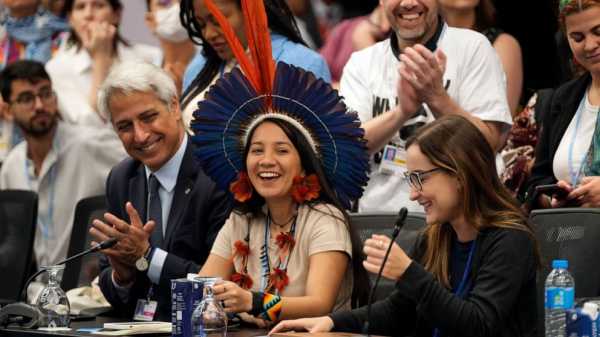
SHARM EL-SHEIKH, Egypt — With only a day left in scheduled climate negotiations in Egypt, diplomats say they are far from getting something everyone can agree on, particularly in the confrontation between developed and developing nations over compensation for climate disasters.
Poorer countries that bear the brunt of climate change, from rising sea levels to extreme flooding, stepped up the urgency, accusing richer polluters of stalling and said they cannot wait another year for the creation of a fund to pay for damages. Some said they were ready to kill a final deal if it doesn't include a fund, while a few richer nations threaten roadblocks over some of the poorer countries' financial proposals.
Egypt's leadership of the summit, called COP27, also came under criticism after it presented early Thursday a 20-page draft for an overarching cover document that delegates said was too long, vague and confusing.
“It is evidently clear that at this late stage of the COP27 process, there are still a number of issues where progress remains lacking,” Egyptian Foreign Minister Sameh Shoukry, the president of the summit, said late Thursday, listing four of the biggest issues of the conference.
Seconds later, U.N. Secretary General Antonio Guterres warned of a “breakdown in trust between North and South, and between developed and emerging economies.”
“The world is watching and has a simple message: stand and deliver,” he told leaders after flying back to Egypt after a world leaders conference in Bali.
Guterres urged countries to “deliver the kind of meaningful climate action that people and planet so desperately need,” adding that there was “no time for finger pointing.”
The negotiation situation was so fragile that the Shoukry kept countries’ chief officials in hours-long sessions Thursday afternoon and evening to try to get things moving.
So far it hasn't quite worked.
During a break from those sessions, Norwegian chief negotiator Henrik Hallgrim Eriksen summed it up this way: “We have a lot of work to do. It’s not in shape. It will take quite a lot of work to have it in good shape. It’s very long. And it’s not well structured.”
Speaking to The Associated Press, Seve Paeniu, finance minister of Tuvalu, expressed concern at the length of the draft, which he noted the Egyptian presidency put forward with less than 48 hours left on the clock.
Negotiators were also surprised by ideas in the Egyptian draft that were never discussed at the two-week talks.
Among them was a call for developed countries to achieve “net-negative carbon emissions by 2030” — a far tougher target than any major nation has so far committed to and which would be very hard to achieve. The EU and U.S., for example, have said they aim to reach net zero emissions by 2050, China by 2060.
The head of the European Parliament at the U.N. climate conference described the document as “a bit of wish list” with "all the topics” thrown in.
Bas Eirkhout said it was "too broad, too many topics, too vague language and too many items, which I don’t think have to be in a cover decision.”
The conference is supposed to end Friday, but past gatherings have been extended to reach a deal.
Longtime negotiations analyst Alden Meyer of E3G said that unlike in previous years, the president of the conference delayed putting together special teams of ministers to push through solutions on big issues, except loss and damage, and that’s putting everything behind.
Senior Western officials, including the European Union climate chief Frans Timmermans, met with Shoukry and warned “there are still lot of gaps remaining” in the draft.
Timmermans said there was a “misunderstanding” over the Egyptian text.
“It wasn’t really a proposal," Timmermans told reporters. "It was just sort of a gathering together of everything they had received, and they sent it on to the parties.”
“The last thing anyone wants is for this COP to end without consensus,” Timmermans, Canadian Climate Minister Steven Guilbeault and Britain's Alok Sharma, who chaired last year’s talks in Glasgow, told the Egyptian foreign minister, according to Sharma’s office.
There are at least half a dozen instances where nations are “taking negotiations hostage” by taking hardline, seemingly inflexible stances, Meyer said. The biggest is on a compensation fund for climate disasters, known as “loss and damage” in negotiators’ parlance.
“Waiting for the next COP or even COP29 is not an option for us. We’re not walking away without this fund,” Marshall Islands climate envoy Kathy Jetn̄il-Kijiner told a press panel. “We’ve been really clear. We need the fund now and it needs to be a fund.”
The climate change minister for Pakistan echoed the call. Pakistan was hit by devastating floods this summer that submerged a third of its territory.
“The clock is ticking” not just on this set of negotiations but on “all of humanity,” said Sherry Rehman. Some outside experts say Rehman may be key to a compromise between rich and poor nations. She was seen huddling with German Foreign Minister Annalena Baerbock late Thursday.
The United States is resisting any fund that would suggest liability and compensation — let alone reparations — for decades of greenhouse gas emissions by industrialized nations.
European countries have backed calls by island nations for a “mosaic” of financial arrangements drawing on public and private sources of money.
But there are big differences over who should pay.
Baerbock said the money should not come only from the industrialized nations, but also major emerging economies whose greenhouse gas emissions have increased sharply in recent decades.
Heavy polluters China and India, however, argue they should not have to contribute because they are still officially considered developing nations.
Pakistan's Rehman told reporters that the group of countries she chairs, known as G77 and China, wants “at the very least a political announcement of intent” on rich polluters providing new financial aid to poor nations for the effects of global warming.
She made clear that she didn’t not expect “a slew of finance” to result from the meeting in Sharm el-Sheikh but added that “if this continues to be kicked down the road we will see this as justice denied.”
Molwyn Joseph, the health, wellness and environment minister for Antigua and Barbuda, said, “Anything less than establishing a loss and damage fund at this COP is a betrayal.”
The issue of loss and damage is one of three financial aid pots discussed. Rich nations agreed in past conferences to spend $100 billion a year to help poorer countries develop cleaner energy systems and adapt to prevent future disasters — though they have lagged in giving the funds.
One longtime participant in the climate talks, Yamide Dagnet of the Open Society Foundation, said developed countries are showing more openness on “loss and damage.”
“But fear of compensation and liability remains a Damocles sword that needs to be overcome,” said Dagnet, a former EU negotiator at the talks.
“The United States is probably the most nervous about how much it can give in on loss and damage after decades of delaying tactics, backed by other developed countries,” she said.
———
Kelvin Chan and Olivia Zhang contributed to this report.
———
Follow AP’s climate and environment coverage at https://apnews.com/hub/climate-and-environment
———
Follow Seth Borenstein on Twitter at @borenbears, Samy Magdy at @sammymagdy and Frank Jordans at @wirereporter.
———
Associated Press climate and environmental coverage receives support from several private foundations. See more about AP’s climate initiative here. The AP is solely responsible for all content.
Sourse: abcnews.go.com





